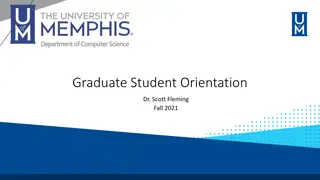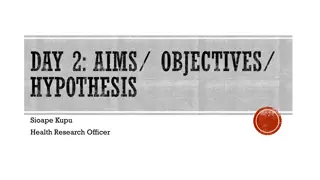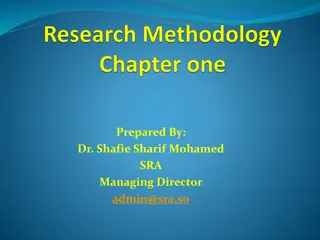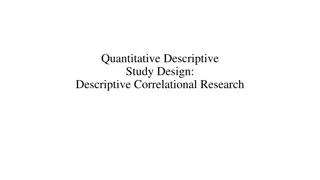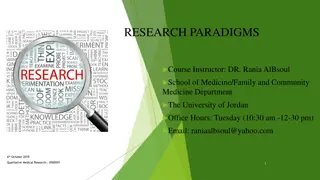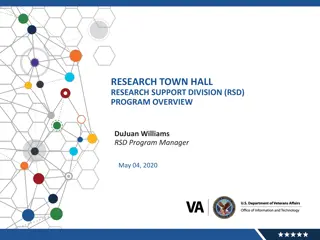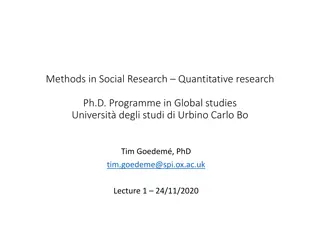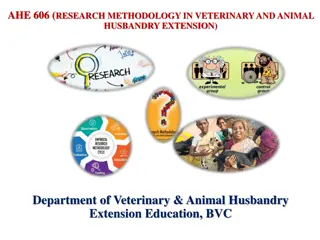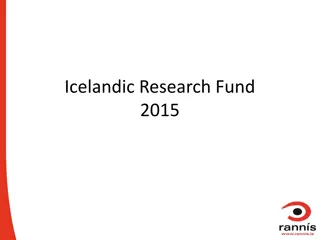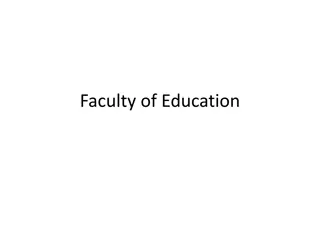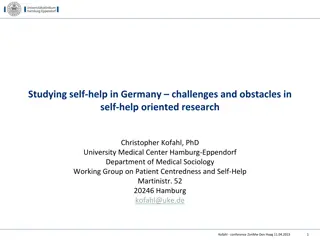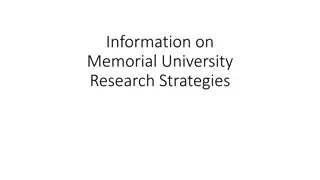Understanding Research: A Comprehensive Overview
Research, as defined by Dr. Subir Kumar Roy, is a systematic and scientific quest for knowledge. It involves problem-solving, knowledge acquisition, and advancing understanding in various domains. Through careful investigation, observation, hypothesis formulation, data collection, and analysis, research contributes to the growth of knowledge and aids in explaining phenomena. The journey of research encompasses defining problems, suggesting solutions, collecting and evaluating data, making deductions, and testing hypotheses. Research is a structured process that leads from the unknown to the known, facilitating the discovery and interpretation of facts to advance human understanding.
Download Presentation

Please find below an Image/Link to download the presentation.
The content on the website is provided AS IS for your information and personal use only. It may not be sold, licensed, or shared on other websites without obtaining consent from the author. Download presentation by click this link. If you encounter any issues during the download, it is possible that the publisher has removed the file from their server.
E N D
Presentation Transcript
Research & Legal Research By By Dr. Subir Kumar Roy Dr. Subir Kumar Roy Associate Professor, Associate Professor, Department of Law & Department of Law & Registrar (Addl. Charge) Registrar (Addl. Charge) Bankura University Bankura University
Research: If any finding contributes to a body of science through following proper scientific method is called Research. Here Science refers to a systematic and organized body of knowledge acquired by adopting a proper scientific method in any specific domain of enquiry. So research can be termed as a scientific and systematic search to resolve a problem or acquiring knowledge in any area of enquiry. It can be defined as, a careful investigation or inquiry specially through search for new facts in any branch of knowledge. (C.R. Kothari, Research Methodology, Methods & Techniques, new age International (P) Limited, Publishers originally quoted From the book of The Advanced Learner s Dictionary of Current English, Oxford, 1952, p. 1069.) It has been defined as, systematized effort to gain new knowledge. (ibid, originally quoted from L.V. Redman and A.V.H. Mory, The Romance of Research, 1923, p.10) so research helps the people to gather knowledge about the happening or occurrence of the different phenomenon or to modify, verify, review the existing knowledge or to enhance the same.
Research in common parlance refers to a search for knowledge. One can also define research as a scientific and systematic search for pertinent information on a specific topic. So all investigation related to an area of enquiry will not be termed as research unless and until it is coupled with scientific and systematic search means the to become research the investigation about a phenomenon must follow a proper research methodology. The search for knowledge must involve the process like specification of a research problem, careful observation of the occurrence or happening of that phenomenon, finding the different variables and ascertaining the relationship thereby, reducing the research problem into hypothesis, formulating the research design and to bring clarity towards collection of data, sampling etc. and the process of their analysis and to conclude the matters on the basis of the study either by inductive or deductive process in the form of solution of the problem or generalisation of the phenomenon by formulating the theory.
Research is an endeavour to discover the facts and investigate the other collateral matters to explain the different phenomenon and thus helps in advancement of knowledge. It is a journey from the precinct of unknown to known, a voyage of discovery with a thoughtful scientific process to actively contribute for advancement of knowledge either by new incitements , new information or interpretation of the happening of a phenomenon. As per Clifford Woody research comprises of defining and redefining problems, formulating hypothesis or suggesting solutions, collecting, organising and evaluating data, making deductions and reaching conclusion and thereby at least to test the hypothesis. (C.R. Kothari, Research Methodology, Methods & Techniques, new age International (P) Limited, Publishers) . So, research involves the knowledge acquired through scientific method which directs for incorporation of certain standard parameters and techniques for making valid observations, interpret them and to generalise the result thereby.
We can test that whether any knowledge is derived by applying scientific method or not by following the metrics mentioned below : 1. Replicable: whether other can repeat the same study and reach on same or at least identical result. 2. Precision: by following the metrics and yardsticks or the formulas or the definitions any one can measure or test that theory or the hypothesis 3. Falsification : a theory based on scientific knowledge either can be falsified or proved and if the same is not possible then simply we can conclude that the same is not based on scientific analysis. 4. Parsimony: parsimony acts as a guiding factor for the researcher to opt the most simplest or logically most economical explanations when there remains the chances of multiple interpretations of a phenomenon.
OBJECTIVES OF RESEARCH To enquire about the occurrence of a phenomenon in order to procure and ensure advancement of knowledge in any area of enquiry or to achieve new insights into it; To scientifically explore, characteristics of a particular individual, situation or a group; To determine the frequency of occurrence of a phenomenon or with which it is associated with something else; To test a hypothesis of a causal relationship between variables ; To enquire for the verification of a fresh theory or to supplement the same by actively contributing into the existing knowledge system explain or interpret the
Legal Research Legal research can be defined as a scientific and systematic enquiry about law in any area of enquiry or an enquiry into the law itself in order to actively contribute for the advancement of science of law. The Black s Law Dictionary defines legal research as the study of law concerned with the effective marshalling of authorities that bear on a question of law (Garner, 2009) . Legislators, Judges, Lawyers, Jurists, legal academia contributes in constant advancement of legal research by supplying the inputs like the rules, regulations, orders, directives, ordinance, bye-laws, judgements, observation, comments, interpretation and research about the impact of a particular law in society or by analysing a particular legal system. Both the description of abstract philosophical questions about the nature of law and the empirical study about the impact of such description of law in society or efficacy of a law/ legal system in society helps in advancement of knowledge about law .
Paul Chynoweth, Legal Research: Accessed from http://www.csas.ed.ac.uk/__data/assets/pdf_file/0005/66542/Legal_Research_Chyno weth_-_Salford_Uni..pdf , Accessed on 22/04/2017
In the previous slide Arthurs has shown the difference in between the pure research mainly indulges by the legal academia and the applied work contributes to the professional needs of the policy makers and the practitioner. It also draws the distinctions in between the doctrinal research in law and the interdisciplinary research mainly involves the empirical research in law. Doctrinal Legal Research: Doctrinal legal research involves the formulation of legal doctrines through the analysis of legal rules. It involves the study of the different statutes, legal system prevailing in any state or provinces, treaties, covenants, conventions, judgments, etc. or to make comparisons with the different legal system with own incitements and following the rule of interpretation and to come in a definite conclusion which helps in advancement of the efficacy of law or to promote an apt law or proper legal system. (Cont.)
Basically, doctrinal legal research advocates in favour of law as it is not the law what it ought to be or in other words we can say that it s concern is not to describe the impact of law in the society. So doctrinal study involves a limited study of law. For example, if a lawyer or an academician wants to do research on Medical Negligence and Law and if follows the limited style or the doctrinal method, surely will confined his study on various laws, statutes, judicial notions on the subject in his own country and the country of other to ascertain the impact of rule of pari materia and the influence of foreign decision upon the decision of the domestic courts of his own country. So, doctrinal legal research is not all the research about law rather it always answers what the law is. In the words of H.L.A. Hart it is the participant- oriented epistemological approach to its object of study. (Paul Chynoweth, Legal Research). Here we may remember the pure theory of law , propounded by Professor Kelsen who said that law has a normative character which dictate how individual will behave without caring for the nature of human behaviour.
Non-doctrinal Legal Research Non doctrinal legal research is also known as socio-legal research or in other words we can say it is the applied form of doctrinal legal research. Doctrinal legal research is mainly confined with the pure legal research which mainly contains the academic value. as it mainly relates with the interpretation of operation of law. On the other hand applied form of research involves the philosophical, moral , economic and political impact of law or the relationship in between the law and society and thus give way to the entry of sociology and law or the critical legal studies or the intrinsic connection in between law and economics (Paul Chynoweth, Legal Research). Non-doctrinal legal research is very helpful to ensure legal reform as it enable to study: the impacts of non- legal matters on legal decisions the efficacy of a policy or legislation to resolve a social problem how to ensure a policy and legislation as pro-bono-publico how to initiate a most cost effective policies To find the gap in between idealism and legal reality






